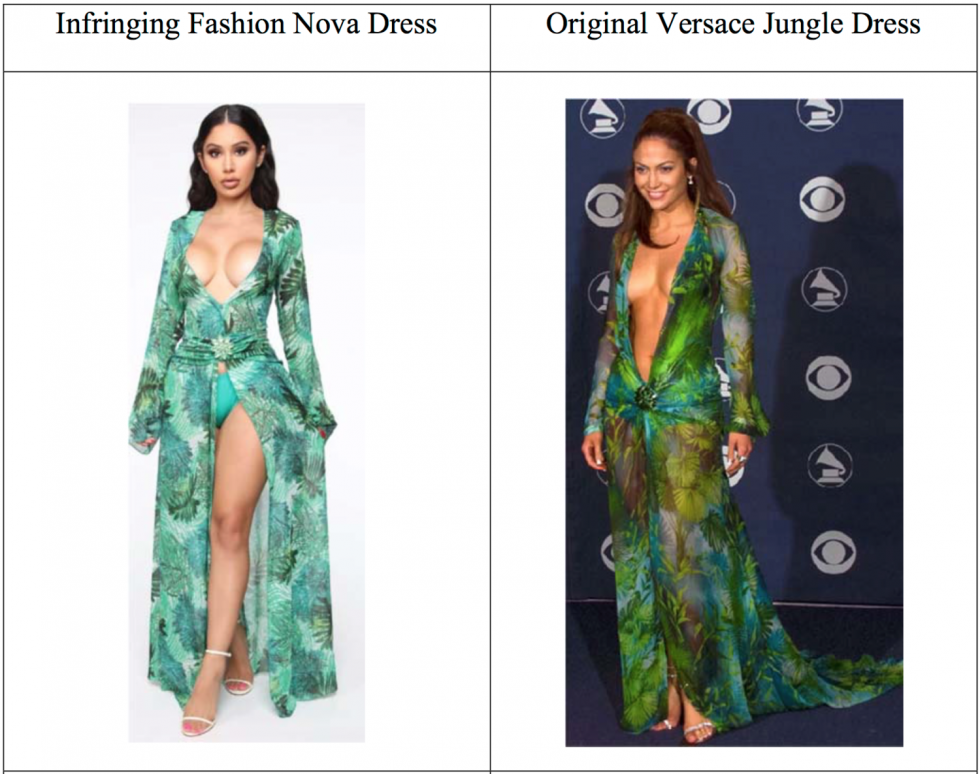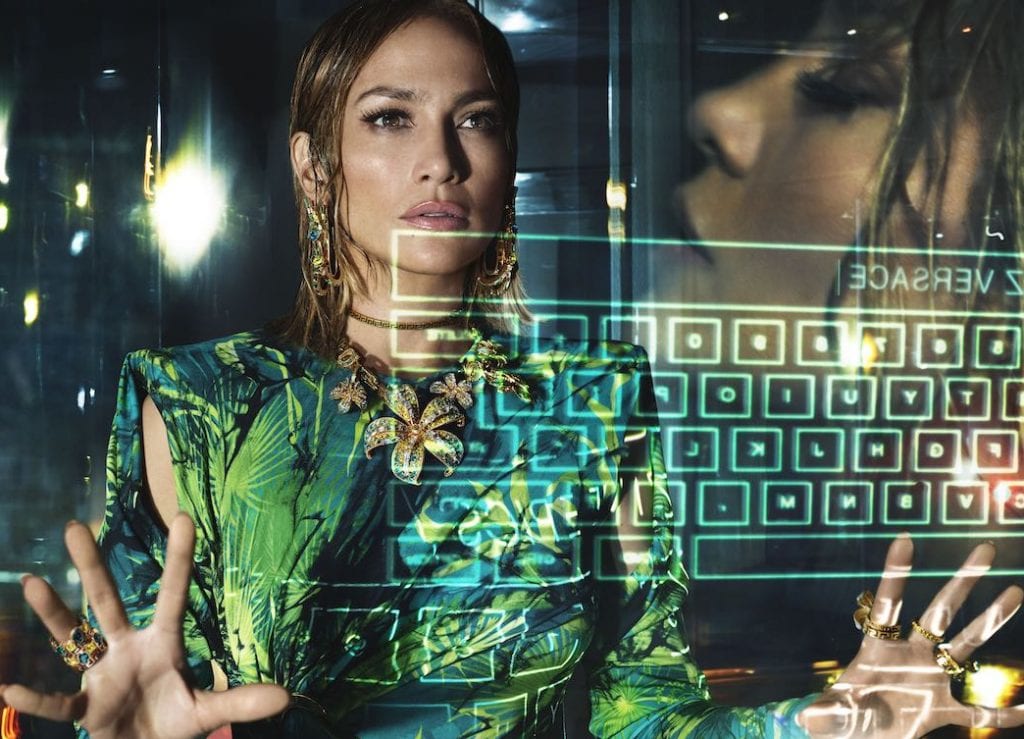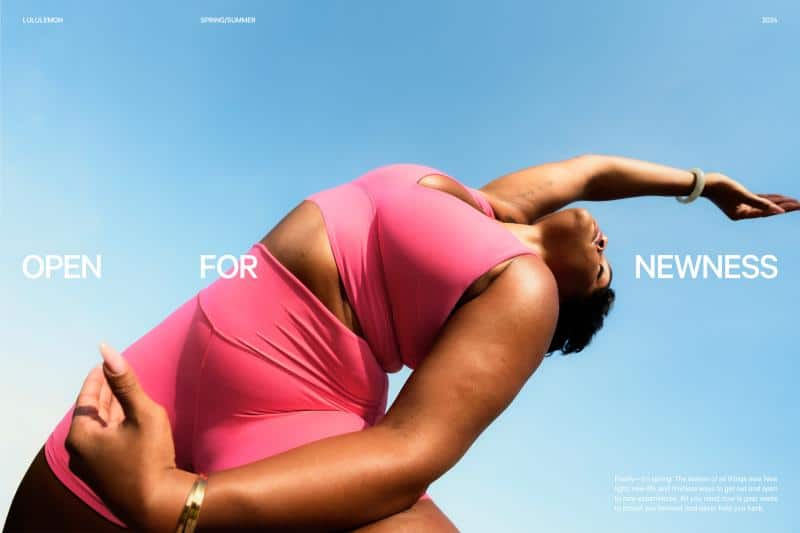Donatella Versace does not have to testify in the lawsuit that Versace filed against Fashion Nova. In the midst of a discovery dispute, which has seen Fashion Nova pushing for Donatella Versace – the Artistic Director and Vice President of the Italian fashion brand – to be required to sit for a deposition in connection with the copyright, trademark and trade dress infringement case that Versace filed against the fast fashion company in November 2019, a federal court in California has sided with Versace, denying Fashion Nova’s request to compel the deposition of the well-known fashion figure.
According to U.S. District Court for the Central District of California Judge Rozella Oliver’s August 13 order, at the heart of the dispute is whether Donatella Versace has relevant and unique information that Antonio Masciariello, Versace’s Company Heritage & Special Projects Senior Manager, did not provide in a recent deposition of his own. According to Fashion Nova, despite deposing Masciariello on August 6, there is, in fact, information relating to the case at hand that it could not obtain, thereby, giving rise to the need for Ms. Versace to testify.
What is that information? According to a letter that counsel for Fashion Nova sent to the court on August 10, it is seeking information about “the design and creation of” Versace’s famed jungle print dress, including why the jungle print as opposed to “a different print on see-through fabric [was chosen] for this design.” Per Fashion Nova, Ms. Versace, as “the alleged inventor of the intellectual property that Versace has asserted in this case,” has that information. More specifically, the company asserted that it needs this information in order to “fully pursue its functionality defense to Versace’s trade dress claims.”
(You may recall that Fashion Nova responded to Versace’s infringement lawsuit by taking issue with the fashion brand’s rights in the various patterns and garment designs, arguing that Versace’s trade dress claims in connection with the jungle print dress, for instance, are barred because the elements of the dress are functional, and therefore, not subject to protected since trademark law only extends to a product’s decorative, non-functional features).
Addressing previous pushback from Versace over the proposed deposition, Fashion Nova stated that “this is not a case where a party is seeking the testimony of a CEO to discover generalized corporate information available from a range of lower-level managers,” and instead, is an attempt by Fashion Nova to seek a “limited scope of information,” given that “Mr. Mascariello had no knowledge and could not testify on the production process for the Jungle Trade Dress.”
“A Tactic for Leverage”
In response to Fashion Nova’s request that the court compel Ms. Versace to testify, the fashion brand argued in a letter of its own that “Fashion Nova’s renewed request to compel the deposition of Donatella Versace should be denied” for a number of reasons, namely: “(i) courts apply heightened scrutiny to requests to depose top-ranking corporate executives” – or “apex” witnesses – “such as Ms. Versace, (ii) Ms. Versace does not possess unique or superior knowledge of any fact that is relevant and material to this lawsuit, (iii) requiring Ms. Versace to prepare and sit for a deposition would impose an undue burden, and (iv) Fashion Nova’s attempt to compel Ms. Versace’s deposition is not an exercise in legitimate fact discovery, but instead a tactic for leverage” – presumably to pressure Versace to agree to settle the lawsuit – “and harassment.”
Siding with Versace in her August 13 order, Judge Oliver held that “with respect to the general issue of deposing creators or designers of trade dresses, the Court finds persuasive [Versace’s] assertion that [Fashion Nova] has not cited to any caselaw to support the contention that depositions of such creators or designers are common in intellectual property litigation for purposes of supporting an invalidity defense.”

“None of the cases cited by [Fashion Nova] ordered a deposition of a creator or designer of a trademark or trade dress, or discussed the significance or relevance of testimony by a creator or designer of a trademark or trade dress to functionality,” the Judge asserted.
Moreover, she held that “the one case offered by the parties that discusses the relevance of deposition testimony of the designer of a trade dress provides that the type of information a designer may possess about the inspiration for a given design would likely be marginal to the issue of a trade dress action, ‘such as what the design actually is (regardless of its source), and how it is presented to and received by the public.’”
The Test for Functionality
The court was similarly unconvinced by Fashion Nova’s argument about how the information that Fashion Nova is seeking from Ms. Versace – the sister of the brand’s late founder Gianni Versace – is relevant. While California-based Fashion Nova has relied on the test for trade dress functionality set forth in Disc Golf Ass’n v. Champion Discs, Inc., it also argued in its letter that it needs to know “why Ms. Versace chose to use a jungle print,” as such testimony about “the subjective reason” behind the print choice, would help to determine “whether the print delivers any utilitarian advantage or whether alternate designs are possible,” which are two of the four Disc Golf factors. (The other two factors are “whether advertising touts the utilitarian advantages of the design, and whether the particular design results from a comparatively simple or inexpensive method of manufacture.”)
The court took issue with this argument, though, stating that “the standard set forth [by way of the four factors] in Disc Golf appears to be an objective standard focused on the ultimate design” and not “a subjective standard” involving a designer’s state of mind in creating and designing a trade dress, as Fashion Nova had proposed.
Beyond that, Judge Oliver held that “it appears from the deposition excerpts provided to the court that Mr. Masciariello did provide an explanation for why Ms. Versace chose the jungle print. (In his deposition, Masciariello revealed, as summarized by Versace in its letter, “that Ms. Versace’s design concept was to create a sexy and revealing evening gown in the ‘70s mood that evokes a tropical vacation,” and thus, that “the Jungle Trade Dress was not designed based on any utilitarian considerations.”).
Still yet, in response to Fashion Nova’s quest for information from Ms. Versace about “samples or prototypes [of the jungle print dress], whether changes were made in the production process, and whether there were differences between the original design and the final version that was ultimately produced,” Judge Oliver held that “it is not apparent how asking Ms. Versace about prototypes or changes in the process of manufacturing the dress would be relevant to whether the ultimate design yields a utilitarian advantage or whether alternative designs are available for the trade dress.”
Ultimately, Judge Oliver held that “the information [that Fashion Nova] contends it needs from Ms. Versace that it could not obtain from Mr. Masciariello is not sufficiently relevant to the case to warrant the deposition of Ms. Versace, or that [Fashion Nova] has not shown the information is uniquely within Ms. Versace’s knowledge.” Denying Fashion Nova’s request to compel the famed designer’s deposition, the Judge did, however, state that the court will require Versace to provide interrogatory responses to Fashion Nova as to the information that it contends was not answered during Masciariello’s deposition.
The court’s decision comes less than a year after Versace filed against Fashion Nova for allegedly selling “deliberate copies and imitations of [its] most famous and recognizable designs, marks, symbols and other protected elements” – from its famed black and gold Barocco print to the “Jungle Print” dress that Jennifer Lopez made famous in 2000 – in an attempt to “exploit the popularity and renown of Versace’s signature designs, and to trade on [its] valuable goodwill and business reputation in order to drive profits and sales to line Fashion Nova’s pockets.”
UPDATED (November 2, 2020): In a newly-filed joint status report, the parties counsels say that settlement talks are in progress: “Following the final pretrial conference on October 16, 2020, the parties continued to have settlement discussions. Specifically, on October 26, 2020, Gianni Versace S.r.l. responded to Fashion Nova, Inc.’s earlier communication regarding settlement. Thereafter, on October 30, 2020, Fashion Nova replied to Versace. The parties continue to evaluate their respective positions.”
*The case is Gianni Versace S.r.l. v. Fashion Nova, Inc. 2:2019-cv-10074 (C.D.Cal).













